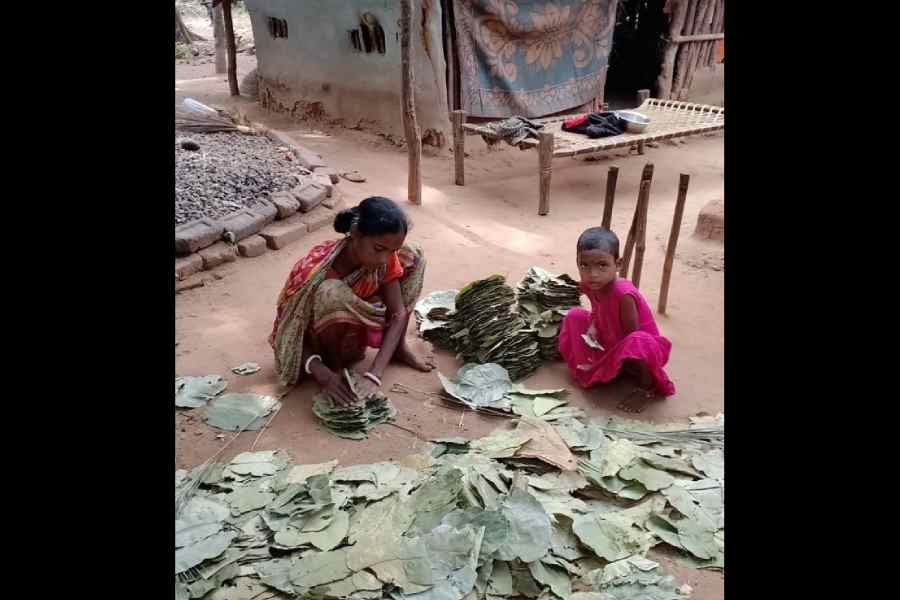The stoppage of MGNREGA work has increased the Jungle Mahal poor’s dependence on forest resources, resulting in a threat to their lives and to the woodlands in Bengal’s western districts, a study by a PhD scholar and his guide has revealed.
“The study has exposed the impact that the suspension of MGNREGA work has had on the poor. Families are now entering the forests to collect resources at least 50 days oftener a year than they used to when the scheme was operational,” said Pravat Kumar Shit, geography teacher and PhD guide to Soumen Bisui.
The survey is part of the research project of Bisui, a PhD scholar at the Research Centre in Natural and Applied Sciences at the Raja N.L. Khan Women’s College (Autonomous) in West Midnapore.
Work under the MGNREGA — which guarantees up to 100 days’ work a year to every rural household — has ceased in Bengal since April 2022 after the Centre stopped sending funds, alleging irregularities.
“It’s alarming — an increased dependence on the forests can have a twofold impact on Jungle Mahal,” Shit said.
“First, going inside the forests more often can pose a threat to life, particularly amid the increasing attacks by elephants. Besides, the families’ efforts (at foraging forest resources) do not make up for the loss of the money they would have earned through the MGNREGA.”
Shit added: “Second, this is leading to the cutting of immature trees, resulting in forest degradation and micro-climate changes.”
Shit said that although forest dwellers are allowed only to collect non-timber forest resources, such as leaves or branches, the survey discovered many people carrying logs of wood on their bicycles, indicating the felling of trees.
Under Shit’s guidance, Bisui travelled to 220 villages across West Midnapore and Jhargram districts over the past two years and interviewed 3,200 households that have job cards. Bisui is studying the economic infrastructure, forest dependence and livelihoods in Jungle Mahal.
The Union rural development ministry passed an order on March 9, 2022, stopping the release of MGNREGA funds to Bengal. However, the ministry had already stopped releasing funds since December 24, 2021, over alleged irregularities in the scheme’s implementation in Bengal.
The Mamata Banerjee government has dismissed the allegations and accused the Centre of freezing the funds to avenge its defeat in the 2021 Assembly polls. Earlier this year, the chief minister ordered the payment of 59 lakh MGNREGA workers’ wage arrears from the state’s coffers.
During the Lok Sabha campaign, Trinamool had made the Centre’s alleged mistreatment of Bengal, particularly the funds freeze, a key issue in rural constituencies. Many in Trinamool believe the plank was instrumental in the party winning 29 of the 42 seats in the state, pushing the BJP down to 12.
“During our visits, most of those deprived of MGNREGA employment expressed their grievances against the (Union) government. The most aggrieved were the women, who can’t move outside for work,” said Bisui, the PhD scholar, who teaches geography at the Vivekananda Satavarshiki Mahavidyalaya in Jhargram.
“When the MGNREGA scheme was operational, the women used to get jobs for at least 30-40 days in their villages. All of them want the work to resume.”
The study revealed that when the job scheme was operational, the 3,200 families with job cards used to earn an average Rs 8,000-10,000 a year, which made up at least 20 per cent of their earnings. (The rest came largely from cultivation, animal rearing and forest foraging.)
The families spent around 40 per cent of the MGNREGA wages on daily household expenses, 28 per cent on agriculture, 15 per cent to repay small loans, and 6 per cent on the education of their children, the survey found. They saved 5 per cent and spent the remaining 6 per cent on other requirements.
Sonia Tudu, 46, a resident of Taldih village in Nayagram block of Jhargram, told the researchers the suspension of the MGNREGA had hamstrung the families’ participation in agriculture, too.
“We used to buy seeds and fertilisers with the money earned from the scheme. With limited work opportunities in the area now, we are finding it harder to engage in cultivation,” she said.
Karmashree, a new scheme funded by the Bengal government that will provide 50 days’ work a year to all the families with MGNREGA job cards, has got off the ground but is yet to gather momentum.










